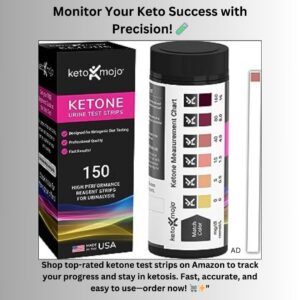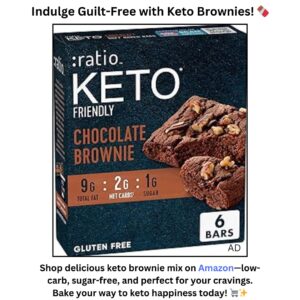Keto-Approved Sweeteners: Everything You Need to Know About Low-Carb Sugar Alternatives 🍯

Introduction: Why Sweeteners Matter on the Keto Diet
One of the most challenging aspects of following a ketogenic diet is giving up sugar. Traditional sugar is high in carbohydrates, which can quickly knock you out of ketosis—the metabolic state in which your body burns fat for fuel instead of glucose. However, satisfying your sweet tooth doesn’t have to be a distant memory. Thanks to keto-approved sweeteners, you can enjoy a wide variety of sweet treats without compromising your diet.
In this comprehensive guide, we’ll dive deep into the world of keto-friendly sweeteners. We’ll explore what makes a sweetener “keto-approved,” discuss the different types of sweeteners available, and provide tips on how to use them effectively in your diet. Whether you’re looking to replace sugar in your morning coffee or bake a batch of low-carb cookies, this guide will help you make informed choices that support your keto lifestyle.
What Makes a Sweetener Keto-Approved?
Before we explore specific sweeteners, it’s important to understand what qualifies a sweetener as “keto-approved.” The key criteria for keto-friendly sweeteners are low or zero net carbs, minimal impact on blood sugar levels, and, ideally, additional health benefits such as antioxidant properties or digestive support.
Net Carbs: The Main Consideration
On a keto diet, the primary focus is on limiting carbohydrate intake to keep your body in ketosis. Net carbs, which are the total carbohydrates minus fiber and sugar alcohols, are what you track. Keto-approved sweeteners should have minimal or zero net carbs to avoid raising blood glucose levels and kicking you out of ketosis.
Glycemic Index and Impact on Blood Sugar
Another crucial factor is the glycemic index (GI) of the sweetener. The GI measures how quickly a food raises blood sugar levels. Foods with a low GI (55 or less) are absorbed more slowly, causing a gradual rise in blood sugar and insulin levels. Keto-approved sweeteners typically have a low or zero GI, meaning they won’t cause spikes in blood sugar and are safe for maintaining ketosis.
Types of Keto-Approved Sweeteners
There are several types of keto-approved sweeteners available, each with its own unique properties, flavors, and best uses. Here, we’ll break down the most popular options, including sugar alcohols, natural sweeteners, and artificial sweeteners.
1. Sugar Alcohols: Low-Carb and Versatile
Sugar alcohols are a popular choice for keto dieters because they provide sweetness without the carbs. They occur naturally in some fruits and vegetables but are often manufactured for use as sweeteners in processed foods and beverages. Common sugar alcohols include erythritol, xylitol, and sorbitol.
Erythritol
Erythritol is one of the most popular sugar alcohols on the keto diet. It has about 70% of the sweetness of sugar but contains only 0.2 calories per gram, and most of it is not absorbed by the body, resulting in almost zero net carbs. Erythritol is also non-glycemic, meaning it does not raise blood sugar levels, making it an excellent choice for maintaining ketosis.
Pros:
- Zero net carbs
- Does not raise blood sugar levels
- Mild, pleasant taste with no aftertaste
- Can be used in baking and cooking
Cons:
- Can cause digestive discomfort in large quantities
- Slight cooling effect in the mouth
Xylitol
Xylitol is another sugar alcohol that is about as sweet as sugar but contains fewer calories. It has 2.4 calories per gram and a low GI of 13. While it does contain some net carbs, xylitol has a minimal impact on blood sugar levels, making it suitable for many keto dieters.
Pros:
- Low glycemic index
- Similar sweetness to sugar
- Provides dental health benefits by reducing the risk of cavities
Cons:
- Contains some net carbs
- Toxic to pets, especially dogs
- Can cause digestive issues like bloating and diarrhea if consumed in large amounts
2. Natural Sweeteners: Plant-Based and Low-Carb
Natural sweeteners are derived from plants and provide sweetness without the carbs or calories associated with sugar. Popular keto-approved natural sweeteners include stevia, monk fruit, and allulose.
Stevia
Stevia is a natural sweetener extracted from the leaves of the Stevia rebaudiana plant. It’s hundreds of times sweeter than sugar, so only a small amount is needed to sweeten foods and drinks. Stevia has zero calories and zero net carbs, making it a favorite among keto dieters.
Pros:
- Zero calories and zero net carbs
- Does not affect blood sugar levels
- Can be used in baking, cooking, and beverages
- Available in liquid, powder, and granulated forms
Cons:
- Some people may detect a bitter or licorice-like aftertaste
- Can be expensive compared to other sweeteners
Monk Fruit
Monk fruit, also known as lo han guo, is a natural sweetener derived from a small melon native to southern China. It’s about 150-200 times sweeter than sugar but contains zero calories and zero net carbs. Monk fruit extract is often combined with other sweeteners like erythritol to balance its sweetness and reduce costs.
Pros:
- Zero calories and zero net carbs
- Does not raise blood sugar levels
- Mild, pleasant taste with no aftertaste
- Rich in antioxidants
Cons:
- More expensive than other sweeteners
- Availability can be limited in some areas
Allulose
Allulose is a rare sugar found in small quantities in some fruits, such as figs and raisins. It has about 70% of the sweetness of sugar but only 0.4 calories per gram, and it’s considered a zero net carb sweetener because it’s not metabolized by the body. Allulose is also low on the glycemic index, making it a great option for keto dieters.
Pros:
- Zero net carbs
- Minimal impact on blood sugar levels
- Similar taste and texture to sugar
- Can be used in baking and cooking
Cons:
- May cause digestive issues in large quantities
- Still relatively new, so long-term effects are less studied
- More expensive than traditional sweeteners
3. Artificial Sweeteners: Low-Carb but Controversial
Artificial sweeteners are synthetic sugar substitutes that provide sweetness with few or no calories. While they are technically low-carb and often used in keto-friendly products, some people prefer to avoid them due to concerns about their long-term health effects.
Sucralose
Sucralose, commonly known as Splenda, is an artificial sweetener that is about 600 times sweeter than sugar. It’s often used in low-carb and sugar-free products because it doesn’t affect blood sugar levels. However, sucralose has been the subject of controversy, with some studies suggesting potential health risks when consumed in large amounts.
Pros:
- Zero calories and zero net carbs
- Does not raise blood sugar levels
- Widely available and affordable
- Heat stable, making it suitable for baking and cooking
Cons:
- Potential long-term health risks
- Can have an artificial aftertaste
- Often mixed with dextrose or maltodextrin, which can add carbs
Aspartame
Aspartame is another widely used artificial sweetener, often found in diet sodas and sugar-free products. It’s about 200 times sweeter than sugar and contains minimal calories. While it has been approved by health authorities, aspartame remains controversial due to concerns about its safety.
Pros:
- Very low in calories
- Does not raise blood sugar levels
- Commonly used in sugar-free and low-carb products
Cons:
- Potential health risks with long-term use
- Not suitable for baking or cooking at high temperatures
- Can cause headaches or other side effects in sensitive individuals
How to Use Keto-Approved Sweeteners in Your Diet
Incorporating keto-approved sweeteners into your diet can help you enjoy sweet flavors while staying within your carb limits. Here are some tips for using these sweeteners effectively:
1. Baking with Keto-Approved Sweeteners
When baking on a keto diet, it’s important to choose sweeteners that provide the right texture and sweetness without adding carbs. Erythritol, allulose, and monk fruit are all excellent choices for baking because they closely mimic the texture and sweetness of sugar. However, remember that these sweeteners may behave differently than sugar in recipes, so you might need to adjust the amount or combine them with other ingredients like almond flour or coconut flour.
2. Sweetening Beverages
If you miss the sweetness of sugar in your coffee, tea, or smoothies, keto-approved sweeteners like stevia, monk fruit, and erythritol are great alternatives. Liquid stevia is particularly convenient for sweetening beverages because it dissolves easily and doesn’t leave a gritty texture. Monk fruit extract can also be a good choice for a more neutral, clean sweetness.
3. Making Keto-Friendly Desserts
Keto-approved sweeteners open up a world of possibilities for creating low-carb desserts. From chocolate fat bombs to keto cheesecake, these sweeteners allow you to indulge your sweet tooth without compromising your diet. When making desserts, consider using a combination of sweeteners to achieve the desired level of sweetness and texture.
4. Monitoring Your Sweetener Intake
While keto-approved sweeteners can be a valuable tool for managing cravings, it’s important not to overdo it. Consuming large amounts of sugar alcohols like erythritol or xylitol can cause digestive discomfort, including bloating, gas, and diarrhea. Additionally, relying too heavily on sweeteners might hinder your progress on the keto diet by keeping your sugar cravings alive. Aim to use sweeteners in moderation and focus on whole, nutrient-dense foods as the foundation of your diet.
Potential Health Benefits of Keto-Approved Sweeteners
Beyond their role in supporting a low-carb diet, many keto-approved sweeteners offer additional health benefits that make them a smart choice for anyone looking to improve their overall health.
1. Antioxidant Properties
Some natural sweeteners, like monk fruit and stevia, are rich in antioxidants, which help protect your body from oxidative stress and inflammation. Antioxidants are crucial for maintaining good health, as they neutralize harmful free radicals that can damage cells and lead to chronic diseases.
2. Improved Dental Health
Sugar alcohols like xylitol are known for their dental health benefits. Unlike sugar, which feeds harmful bacteria in the mouth, xylitol actually inhibits the growth of these bacteria, reducing the risk of cavities and gum disease. Incorporating xylitol into your diet can help promote better oral health while still allowing you to enjoy sweet flavors.
3. Weight Management
Using keto-approved sweeteners can support weight management by allowing you to enjoy sweet foods without the added calories and carbs of sugar. This can help reduce overall calorie intake, making it easier to maintain a healthy weight or achieve weight loss goals.
4. Blood Sugar Control
For people with diabetes or insulin resistance, keto-approved sweeteners can be a valuable tool for managing blood sugar levels. Because these sweeteners do not cause significant spikes in blood glucose, they allow individuals to enjoy sweet foods without the risk of hyperglycemia.
Common Myths and Misconceptions About Keto-Approved Sweeteners
As with any dietary topic, there are several myths and misconceptions surrounding keto-approved sweeteners. Here, we’ll address some of the most common concerns and provide evidence-based answers.
1. Myth: All Sweeteners Are Bad for You
Some people believe that all sweeteners, whether natural or artificial, are harmful to health. However, this is not necessarily true. While it’s important to be mindful of your sweetener intake, many keto-approved sweeteners have been shown to be safe when consumed in moderation. In fact, some sweeteners like stevia and monk fruit even offer health benefits such as antioxidant properties and blood sugar regulation.
2. Myth: Keto-Approved Sweeteners Will Kick You Out of Ketosis
Another common misconception is that consuming any type of sweetener will kick you out of ketosis. While this might be true for high-carb sweeteners like sugar and honey, keto-approved sweeteners such as erythritol, stevia, and monk fruit have minimal to no impact on blood sugar and insulin levels. As long as you stay within your carb limits, these sweeteners should not affect your ketosis.
3. Myth: All Sugar Alcohols Are the Same
Not all sugar alcohols are created equal. For example, erythritol has almost zero net carbs and does not raise blood sugar levels, making it a popular choice for keto dieters. On the other hand, some sugar alcohols like maltitol have a higher glycemic index and can cause a more significant rise in blood sugar. It’s important to choose sugar alcohols that align with your keto goals and to be aware of their individual properties.
Conclusion: Finding the Best Keto-Approved Sweeteners for You
Navigating the world of keto-approved sweeteners can seem overwhelming at first, but with the right information, you can make choices that fit your dietary needs and preferences. Whether you prefer natural sweeteners like stevia and monk fruit or sugar alcohols like erythritol and xylitol, there are plenty of options to help you satisfy your sweet tooth while staying on track with your keto diet.
Remember, the key to successfully incorporating sweeteners into your keto lifestyle is moderation. While these sweeteners can be a great tool for managing cravings, it’s important to focus on whole, nutrient-dense foods as the foundation of your diet. By choosing the right sweeteners and using them wisely, you can enjoy a wide variety of delicious keto-friendly treats without compromising your health or your progress.
Experiment with Keto-Approved Sweeteners Today 🚀
Ready to explore the world of keto-approved sweeteners? Start experimenting with different options to find the ones that work best for you. Whether you’re baking, sweetening your morning coffee, or making keto-friendly desserts, there’s a sweetener out there that can help you stay on track with your low-carb lifestyle. For more keto tips, recipes, and inspiration, subscribe to our newsletter and stay connected with the latest updates in ketogenic living.









